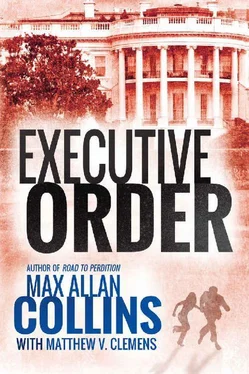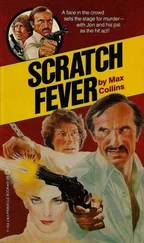Resting a hand on his wife’s knee, Mr. Wooten said, “Connie, these people are from the FBI. If they look into our financials for five minutes, they’ll find the money. I used to work for the government — I know .”
“Sir,” Rogers asked, trying not to betray the stir within her, “what money are you referring to?”
Mr. Wooten glanced at his wife, who closed her eyes and gave him a tiny nod.
Then he said, “A few months ago, Anthony put some money away for us.”
“Away where, sir?”
“In an account in the... what are they called? Cayman Islands. Under our name.”
“How much?”
“... Quite a bit.”
“How much, sir?”
“... One hundred thousand dollars.”
The agents traded looks.
Rogers asked, “Did Anthony tell you where that money came from?”
Mr. Wooten tried to maintain eye contact with her, but couldn’t. “Anthony said his contract work was paying nicely, and he just wanted to put some retirement money away.”
Hardesy asked, “For himself or for you?”
“For... well, for all of us. Whichever of us needed it more. I have a decent pension, and we don’t want for much of anything, so... really, I suppose it would eventually go to Anthony. Would have gone.”
Rogers asked, “You didn’t press him on where he got that kind of money?”
Shaking his head a little, Mr. Wooten said, “Agent Rogers, I’ll admit to you that I... I didn’t really want to know.”
“Do you have the account information?”
He sighed. Seemed defeated, and not by his guests — by life. “Connie can get it for you. We’re going to lose that money, aren’t we?”
Rogers shook her head. “I don’t really know.”
Anthony’s mother got up and went to a bedroom in the back of the house, Nichols tagging along with her. Several awkwardly silent minutes passed before the two women returned; Nichols, with a manila folder in hand, gave Rogers a nod.
Rising, Rogers said, “We’ll look into this, Mr. and Mrs. Wooten. We will, I assure you, do everything we can to find the person responsible for your son’s death... Is there someone you can call to come stay with you?”
The Wootens were on their feet, too, standing hand in hand.
“Thank you,” Mr. Wooten said. “We’ll be fine. Our other children are still in the area, and we’ll call them right away. Do you... do you have any idea what Anthony was doing in Maryland?”
Rogers knew exactly what he was doing — he was plotting the assassination of the Secretary of the Interior.
“No, sir,” she told him, “no idea at all.”
“The point in history at which we stand is full of promise and danger. The world will either move forward toward unity and widely shared prosperity — or it will move apart.”
Franklin Delano Roosevelt, thirty-second President of the United States of America. Served 1933–1945. The only person to win four presidential elections.
When he entered the Oval Office, Joe Reeder found the President in shirtsleeves and tie behind that familiar, formidable desk, looking like his best friend had just died. Chief of Staff Timothy Vinson, certainly not the friend in question, stood to Harrison’s left side, seething, mustache twitching, a boil in a three-piece suit on the verge of bursting.
Jesus, Reeder thought, this guy is in full-blown Yosemite Sam mode.
Harrison motioned to Reeder to join them, and he quickly did, standing opposite, nodding, saying, “Mr. President.”
The commander in chief asked the ex-Secret Service agent, “Are you getting anywhere, Joe? On the direct line, Krakenin is stopping just short of accusing us... of accusing me... of inciting war. And the back-channel chatter is even worse.”
Dubbed “the Kraken” by American media outlets, Boris Mikhailovich Krakenin, President of the Russian Federation, was a notorious saber-rattler. But the Russian incursion into Azbekistan was not just a threat, and the deaths of four CIA agents in the midst of it put both nations at the precipice.
Preferring not to brief the President with Vinson present, Reeder said, “Making progress, sir, yes.”
Vinson began to pace a small area near the big desk, words tumbling out of him. “Boris has taken to referring to the Azbekistani government as a ‘puppet regime,’ accusing us of propping up a handful of insurgents. He doesn’t consider his own country’s actions as an invasion, oh no... just rightfully putting down a rebellion.”
“A rebellion,” Harrison said dryly, “in the form of a freely elected democratic government going back six years.”
“Krakenin,” Reeder said, “makes Putin look like a pushover.”
Harrison cocked his head. “You know the man?”
“‘Know him’ overstates it. I met him once, years ago. Secret Service days, when now-President Krakenin was serving in the FSB under General Bortnikov.”
These three were well aware that the Russian Federal Security Service was home to many a ruthless bastard.
Harrison asked, “Any thoughts on comrade Boris?”
Reeder shrugged. “Only that he considered Putin a weak sister and Stalin the consummate Russian leader. Some men lead with an iron fist. Krakenin heats up that iron fist in a forge till it burns a nice bright orange.”
The President was nodding. “He’s a hard-ass of the first order, little doubt of that. But do you think he really wants war?”
Reeder smiled thinly. “Mr. President, with all due respect, you have access to far more worthy analysts than some lowly security-outfit exec.”
“With all due respect, Joe,” Harrison said, with his own restrained grin, “false modesty doesn’t suit you. For decades you’ve stood at the sides of Presidents, in this very office, and seen and heard so very much. Don’t they call you the People Reader? So based on your observations of Boris Badenov, years ago and in his on-air appearances of more recent times... what do you think he’s up to?”
“Not war.”
Vinson’s laugh was both immediate and bitterly derisive.
Harrison gave his Chief of Staff a quick sharp look, cutting the laugh off, and Vinson looked on in surly silence.
“What makes that your opinion, Joe,” Harrison asked, “considering the man recklessly invaded a sovereign nation, and got four of our agents killed?”
Reeder’s tone could not have been more matter-of-fact. “He doesn’t want war — he wants portillium.”
Vinson frowned and growled, “What the holy hell is portillium?”
Quietly the President said, “The element that lends stability to Senkstone as a plastic explosive.”
They all knew what Senkstone was — the most versatile and dangerous munition of its kind yet developed.
Harrison said, “Boris wants the rich veins of portillium, known only to that region, found underneath the otherwise unimpressive surface of Azbekistan.”
Reeder said, “Taking over that pimple on the face of the planet is the most expedient way to acquire that scarce element in quantity.”
“Science fiction,” Vinson muttered.
“Is it?” the President asked. “All of this came to classified light when the Special Situations Task Force discovered the existence of Senkstone.”
Reeder nodded. “Boris’s people go in, mine as much as they can, until a truly serious United Nations threat comes along... which after all could take decades... and then retreat to the border with all the portillium they can carry, and generously let Azbekistan have its ravaged land back.”
The President, looking rather sick, said, “And with the ability to contrive that much Senkstone, Boris can do...”
“Pretty much anything he wants,” Reeder finished.
Thanks to portillium, Senkstone’s best quality as a plastic explosive was that it was stable enough to use in a 3D printer, and could be molded to mimic anything. Like to match some world leader’s eyeglasses for an assassination. Or, shaped in some manner that disguised its purpose, blow up the White House.
Читать дальше












